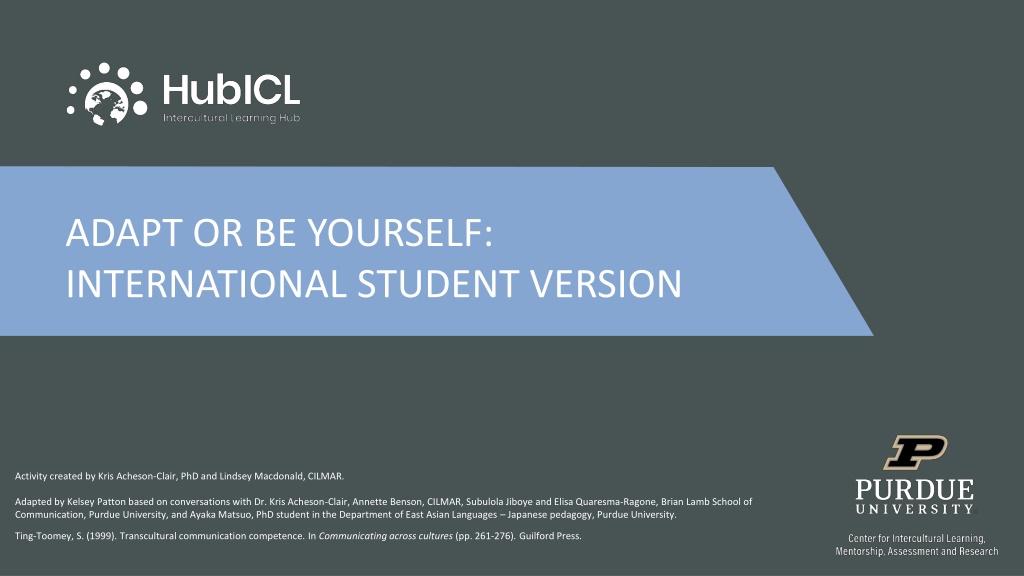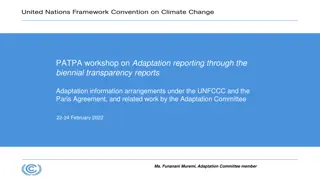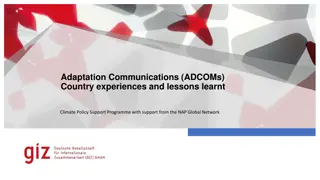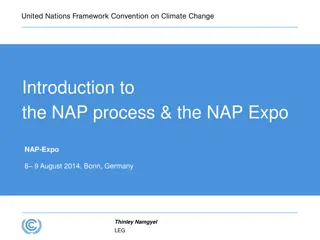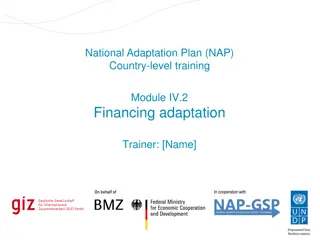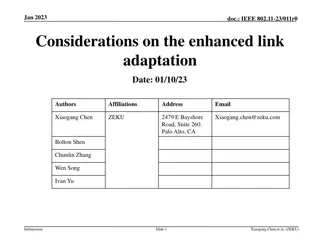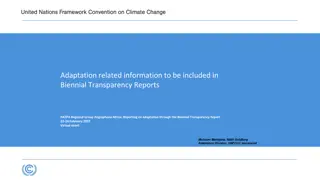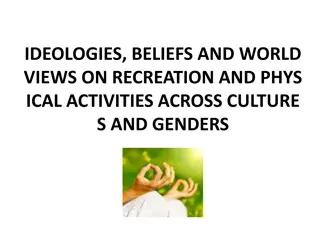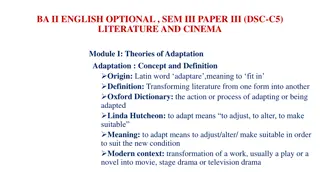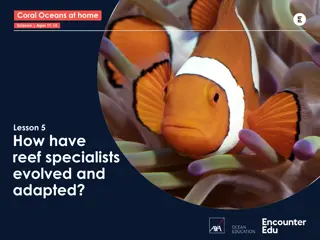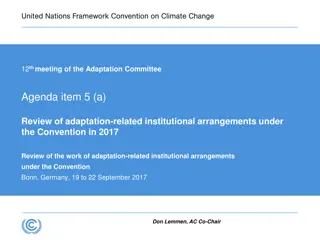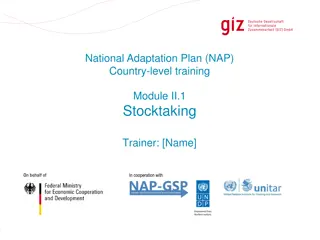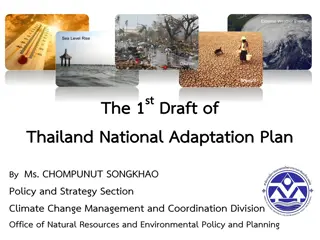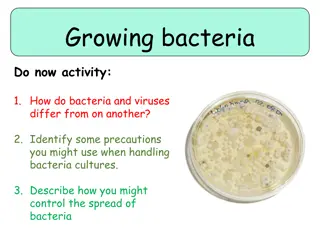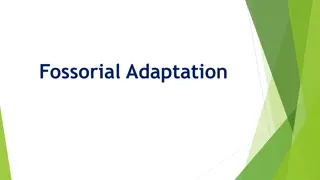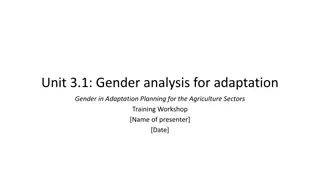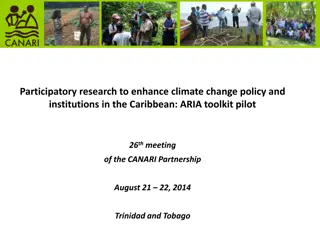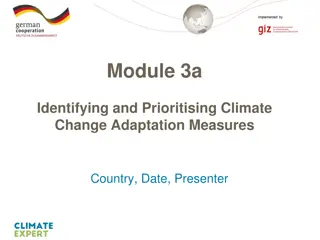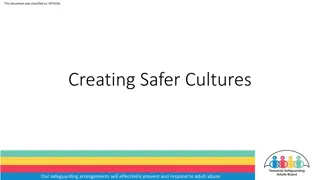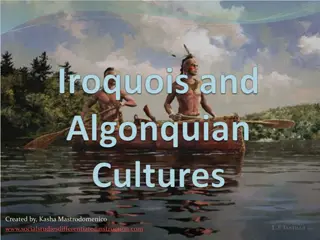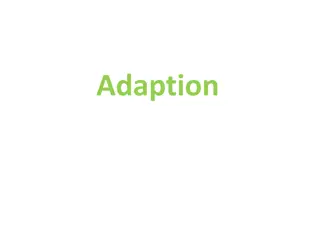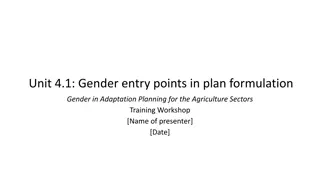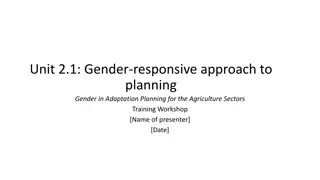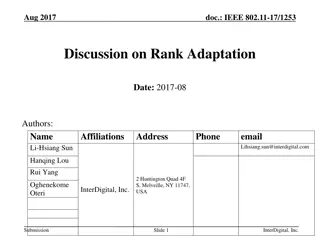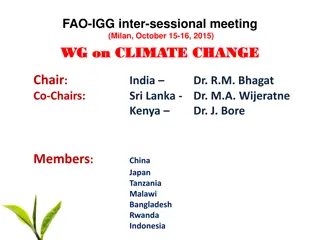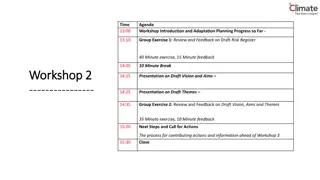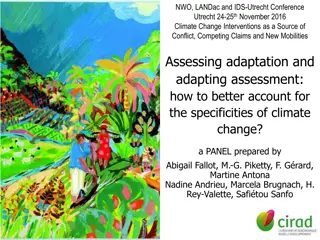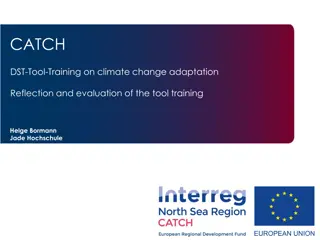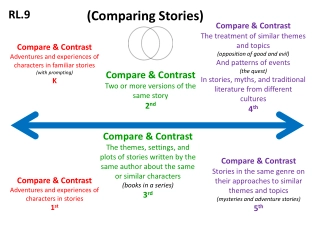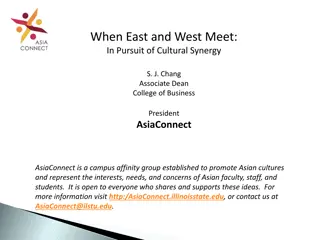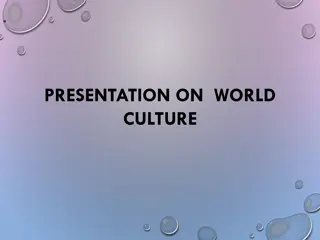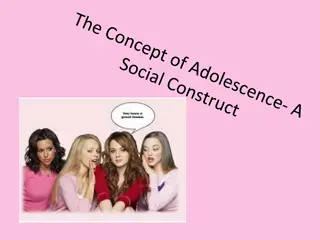Understanding Adaptation Across Cultures
Explore the concept of adaptation in diverse cultural contexts, discussing the importance of adapting, decision-making processes, and the impact of adaptation. Engage in introspective activities to enhance transcultural communication competence. Derived from Ting-Toomey's work, delve into personal experiences and consequences of adaptation.
Download Presentation

Please find below an Image/Link to download the presentation.
The content on the website is provided AS IS for your information and personal use only. It may not be sold, licensed, or shared on other websites without obtaining consent from the author. Download presentation by click this link. If you encounter any issues during the download, it is possible that the publisher has removed the file from their server.
E N D
Presentation Transcript
ADAPT OR BE YOURSELF: INTERNATIONAL STUDENT VERSION Activity created by Kris Acheson-Clair, PhD and Lindsey Macdonald, CILMAR. Adapted by Kelsey Patton based on conversations with Dr. Kris Acheson-Clair, Annette Benson, CILMAR, Subulola Jiboye and Elisa Quaresma-Ragone, Brian Lamb School of Communication, Purdue University, and Ayaka Matsuo, PhD student in the Department of East Asian Languages Japanese pedagogy, Purdue University. Ting-Toomey, S. (1999). Transcultural communication competence. In Communicating across cultures (pp. 261-276). Guilford Press.
ADAPT OR BE YOURSELF: INTRODUCTIONS Please share: Your name Where is home for you? How do you prefer to communicate digitally? Calling Texting Voice notes Video chatting Something else
ADAPT OR BE YOURSELF: AGENDA 1. What is adaptation and what is your experience with adaptation? 2. Adapt or be yourself activity 3. Debrief
ADAPT OR BE YOURSELF: LEARNING OBJECTIVES 1. Articulate what is important to you when deciding to adapt (or not) across cultures and contexts. 2. Describe the ways in which others make adaptation decisions.
ADAPT OR BE YOURSELF What is adaptation?
ADAPT OR BE YOURSELF What is adaptation? How we change or shift our behaviors based on the requirements of a situation. Ting-Toomey (1999)
ADAPT OR BE YOURSELF What is adaptation? Do I have the skills and knowledge I would need to adapt, i.e., can I adapt effectively? Do others want or expect me to adapt, i.e., is it appropriate to adapt in this situation? Would adapting violate or conflict with my deep-seated morality or ethics, i.e., would adapting be satisfactory? Ting-Toomey (1999)
ADAPT OR BE YOURSELF What has been your experience like adapting in your new cultural context? What are the consequences of adaptation? For you? For whom you are adapting (or not) to?
ADAPT OR BE YOURSELF What does this clip have to do with adaptation? Who adapts to whom? What influences the characters decisions to adapt (or not)?
ADAPT OR BE YOURSELF Imagine your first few weeks in the U.S. You will be presented with several cultural behaviors or situations that you likely encountered. For each of these behaviors or situations, choose whether you adapted or not to the cultural expectations in the context you find yourself in.
ADAPT OR BE YOURSELF Do you: 1. Adapt to the local culture 2. Be yourself (do what comes naturally to you) 3. Being myself works in the local culture 4. "I blend cultural practices
ADAPT OR BE YOURSELF GO TO: kahoot.it
ADAPT OR BE YOURSELF How you dress. 1. Adapt to the local culture Do I have the skills and knowledge I would need to adapt, i.e., can I adapt effectively? Ex: Dressing more modestly or less modestly, dressing according to gender norms, wearing traditional garments, etc. 2. Be yourself (do what comes naturally to you) Do others want or expect me to adapt, i.e., is it appropriate to adapt in this situation? 3. Being myself works in the local culture Would adapting violate or conflict with my deep-seated morality or ethics, i.e., would adapting be satisfactory? 4. "I blend cultural practices
ADAPT OR BE YOURSELF How you style your hair. 1. Adapt to the local culture Do I have the skills and knowledge I would need to adapt, i.e., can I adapt effectively? 2. Be yourself (do what comes naturally to you) Ex: Pulling your hair back, wearing your hair down in its natural state, covering your hair, straightening or curling your hair, etc. Do others want or expect me to adapt, i.e., is it appropriate to adapt in this situation? 3. Being myself works in the local culture Would adapting violate or conflict with my deep-seated morality or ethics, i.e., would adapting be satisfactory? 4. "I blend cultural practices
ADAPT OR BE YOURSELF Participating in a religious ceremony (for a religion you do not practice). 1. Adapt to the local culture Do I have the skills and knowledge I would need to adapt, i.e., can I adapt effectively? 2. Be yourself (do what comes naturally to you) Do others want or expect me to adapt, i.e., is it appropriate to adapt in this situation? 3. Being myself works in the local culture Ex: Praying, taking communion, going on a pilgrimage, meditating, etc. Would adapting violate or conflict with my deep-seated morality or ethics, i.e., would adapting be satisfactory? 4. "I blend cultural practices
ADAPT OR BE YOURSELF How you interact with someone of a different gender identity. 1. Adapt to the local culture Do I have the skills and knowledge I would need to adapt, i.e., can I adapt effectively? 2. Be yourself (do what comes naturally to you) Do others want or expect me to adapt, i.e., is it appropriate to adapt in this situation? 3. Being myself works in the local culture Ex: Making/not making eye contact, taking on either a subservient or dominant role, using an intermediary or making sure you have a chaperone, etc. Would adapting violate or conflict with my deep-seated morality or ethics, i.e., would adapting be satisfactory? 4. "I blend cultural practices
ADAPT OR BE YOURSELF How you interact with authority figures. 1. Adapt to the local culture Do I have the skills and knowledge I would need to adapt, i.e., can I adapt effectively? 2. Be yourself (do what comes naturally to you) Do others want or expect me to adapt, i.e., is it appropriate to adapt in this situation? 3. Being myself works in the local culture Ex: Challenging or not challenging an authority figure, calling them a formal title or referring to them in more casual terms, etc. Would adapting violate or conflict with my deep-seated morality or ethics, i.e., would adapting be satisfactory? 4. "I blend cultural practices
ADAPT OR BE YOURSELF The level of affection you show your friend or romantic partner in public. 1. Adapt to the local culture Do I have the skills and knowledge I would need to adapt, i.e., can I adapt effectively? 2. Be yourself (do what comes naturally to you) Do others want or expect me to adapt, i.e., is it appropriate to adapt in this situation? 3. Being myself works in the local culture Ex: Kissing or not kissing, holding hands or not holding hands, etc. Would adapting violate or conflict with my deep-seated morality or ethics, i.e., would adapting be satisfactory? 4. "I blend cultural practices
ADAPT OR BE YOURSELF Undergoing or hiding body modification. 1. Adapt to the local culture Do I have the skills and knowledge I would need to adapt, i.e., can I adapt effectively? 2. Be yourself (do what comes naturally to you) Do others want or expect me to adapt, i.e., is it appropriate to adapt in this situation? 3. Being myself works in the local culture Ex: Piercings, tattoos, cosmetic surgery, etc. Would adapting violate or conflict with my deep-seated morality or ethics, i.e., would adapting be satisfactory? 4. "I blend cultural practices
ADAPT OR BE YOURSELF How you speak. 1. Adapt to the local culture Do I have the skills and knowledge I would need to adapt, i.e., can I adapt effectively? 2. Be yourself (do what comes naturally to you) Do others want or expect me to adapt, i.e., is it appropriate to adapt in this situation? 3. Being myself works in the local culture Ex: Language you use, vocabulary you use, etc. Would adapting violate or conflict with my deep-seated morality or ethics, i.e., would adapting be satisfactory? 4. "I blend cultural practices
ADAPT OR BE YOURSELF How you use nonverbals in social settings. 1. Adapt to the local culture Do I have the skills and knowledge I would need to adapt, i.e., can I adapt effectively? 2. Be yourself (do what comes naturally to you) Do others want or expect me to adapt, i.e., is it appropriate to adapt in this situation? 3. Being myself works in the local culture Ex: Eye contact, distance between you and others, gesturing, etc. Would adapting violate or conflict with my deep-seated morality or ethics, i.e., would adapting be satisfactory? 4. "I blend cultural practices
ADAPT OR BE YOURSELF How you get to know someone. 1. Adapt to the local culture Do I have the skills and knowledge I would need to adapt, i.e., can I adapt effectively? 2. Be yourself (do what comes naturally to you) Do others want or expect me to adapt, i.e., is it appropriate to adapt in this situation? Ex: Asking or not asking questions (and types of questions), observing, participating in activities, outings, coffee out, etc. (side-by-side vs face-to-face) 3. Being myself works in the local culture Would adapting violate or conflict with my deep-seated morality or ethics, i.e., would adapting be satisfactory? 4. "I blend cultural practices
ADAPT OR BE YOURSELF How you organize, participate in, and show up to social gatherings. 1. Adapt to the local culture Do I have the skills and knowledge I would need to adapt, i.e., can I adapt effectively? 2. Be yourself (do what comes naturally to you) Do others want or expect me to adapt, i.e., is it appropriate to adapt in this situation? 3. Being myself works in the local culture Ex: Presence or lack of end time, guest arrival time, expectations around entering and leaving a host s home, how long in advance you plan/communicate about an event, bringing a gift, etc. Would adapting violate or conflict with my deep-seated morality or ethics, i.e., would adapting be satisfactory? 4. "I blend cultural practices
ADAPT OR BE YOURSELF Accepting food or drink offered to you when it goes against your dietary preferences or restrictions. 1. Adapt to the local culture Do I have the skills and knowledge I would need to adapt, i.e., can I adapt effectively? 2. Be yourself (do what comes naturally to you) Do others want or expect me to adapt, i.e., is it appropriate to adapt in this situation? 3. Being myself works in the local culture Ex: Accepting meat when you re a vegetarian, accepting food or drink that is normally off limits due to religious beliefs (pork, shellfish, etc.), accepting alcohol when you normally refrain from drinking, etc. Would adapting violate or conflict with my deep-seated morality or ethics, i.e., would adapting be satisfactory? 4. "I blend cultural practices
ADAPT OR BE YOURSELF How you interact with people in the service industry (restaurant servers, taxi drivers, etc.). 1. Adapt to the local culture Do I have the skills and knowledge I would need to adapt, i.e., can I adapt effectively? 2. Be yourself (do what comes naturally to you) Do others want or expect me to adapt, i.e., is it appropriate to adapt in this situation? 3. Being myself works in the local culture Would adapting violate or conflict with my deep-seated morality or ethics, i.e., would adapting be satisfactory? Ex: Tipping or not tipping, calling them by their name or the title of their position, snapping your fingers or lining up, etc. 4. "I blend cultural practices
ADAPT OR BE YOURSELF How you eat. 1. Adapt to the local culture Do I have the skills and knowledge I would need to adapt, i.e., can I adapt effectively? 2. Be yourself (do what comes naturally to you) Ex: Eating with utensils, type of utensils, eating with hands, slurping, etc. Do others want or expect me to adapt, i.e., is it appropriate to adapt in this situation? 3. Being myself works in the local culture Would adapting violate or conflict with my deep-seated morality or ethics, i.e., would adapting be satisfactory? 4. "I blend cultural practices
ADAPT OR BE YOURSELF How you introduce yourself and how you refer to others. 1. Adapt to the local culture Do I have the skills and knowledge I would need to adapt, i.e., can I adapt effectively? 2. Be yourself (do what comes naturally to you) Do others want or expect me to adapt, i.e., is it appropriate to adapt in this situation? 3. Being myself works in the local culture Would adapting violate or conflict with my deep-seated morality or ethics, i.e., would adapting be satisfactory? Ex: Which name you use, how you present yourself, etc. 4. "I blend cultural practices
ADAPT OR BE YOURSELF How you communicate on social media and messaging platforms. 1. Adapt to the local culture Do I have the skills and knowledge I would need to adapt, i.e., can I adapt effectively? 2. Be yourself (do what comes naturally to you) Do others want or expect me to adapt, i.e., is it appropriate to adapt in this situation? 3. Being myself works in the local culture Would adapting violate or conflict with my deep-seated morality or ethics, i.e., would adapting be satisfactory? 4. "I blend cultural practices Ex: Calling only, video chat, texting only, etc.
ADAPT OR BE YOURSELF What time you eat. 1. Adapt to the local culture Do I have the skills and knowledge I would need to adapt, i.e., can I adapt effectively? 2. Be yourself (do what comes naturally to you) Do others want or expect me to adapt, i.e., is it appropriate to adapt in this situation? 3. Being myself works in the local culture Ex: Breakfast, lunch, dinner, eating a late dinner, snacks, etc. Would adapting violate or conflict with my deep-seated morality or ethics, i.e., would adapting be satisfactory? 4. "I blend cultural practices
ADAPT OR BE YOURSELF How you share information about yourself. 1. Adapt to the local culture Do I have the skills and knowledge I would need to adapt, i.e., can I adapt effectively? 2. Be yourself (do what comes naturally to you) Do others want or expect me to adapt, i.e., is it appropriate to adapt in this situation? 3. Being myself works in the local culture Ex: Sharing personality characteristics, interests, about family, etc. Would adapting violate or conflict with my deep-seated morality or ethics, i.e., would adapting be satisfactory? 4. "I blend cultural practices
ADAPT OR BE YOURSELF How you indicate where you are from. 1. Adapt to the local culture Do I have the skills and knowledge I would need to adapt, i.e., can I adapt effectively? 2. Be yourself (do what comes naturally to you) Do others want or expect me to adapt, i.e., is it appropriate to adapt in this situation? 3. Being myself works in the local culture Ex: Country name, city name, region name, qualifying language, etc. Would adapting violate or conflict with my deep-seated morality or ethics, i.e., would adapting be satisfactory? 4. "I blend cultural practices
ADAPT OR BE YOURSELF How you seek help. 1. Adapt to the local culture Do I have the skills and knowledge I would need to adapt, i.e., can I adapt effectively? 2. Be yourself (do what comes naturally to you) Do others want or expect me to adapt, i.e., is it appropriate to adapt in this situation? 3. Being myself works in the local culture Ex: Asking directly vs indirectly, asking peers or authority figures, etc. Would adapting violate or conflict with my deep-seated morality or ethics, i.e., would adapting be satisfactory? 4. "I blend cultural practices
ADAPT OR BE YOURSELF What scenarios would you add? Discuss in small groups..
ADAPT OR BE YOURSELF: DEBRIEF Which scenarios did you add? How did it feel to go through these scenarios? In what situations did you choose to adapt (or not) and what criteria did you use to make that decision? What is important about effective adaptation? What is important about appropriate adaptation? What is important about satisfactory adaptation? Would you add or subtract any criteria (outside of effective, appropriate, and satisfactory)?
ADAPT OR BE YOURSELF: DEBRIEF Were there any situations where it was particularly easy or difficult to make a choice to adapt or not? If so, why? Were there any instances where you felt the choice to adapt would be dependent on the specific scenario? If so, can you provide the group with an example (i.e., who was involved? where did this scenario take place? when did this scenario happen?, etc.)? Would you add any behaviors or situations to the list?
ADAPT OR BE YOURSELF: DEBRIEF Where do you feel the most pressure to adapt? Where have you adapted that you wish you hadn t and/or didn t have to? Whose responsibility is it to adapt? What does it mean to be yourself? What is the local culture?
ADAPT OR BE YOURSELF: DEBRIEF Have you experienced anyone adapting to you here in the U.S.? What happened? How did you feel? What if we were talking about adapting in your home country context? How would this change your decisions? Based on your experiences, what advice would you give someone struggling to adapt to life in the U.S.? What did you learn about adapting to different cultures?
